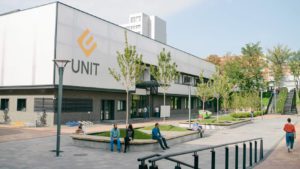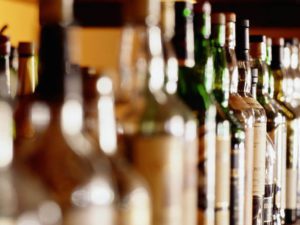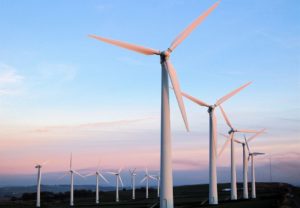
UDP of businessman Vasyl Khmelnytsky in partnership with KAN Development on Wednesday took part in the ribbon-cutting ceremony of the third campus – a new six-story B12 business center with a gross area of 16,900 square meters – in the UNIT.City innovation park (Kyiv). “We have already invested $50 million [in the construction of UNIT.City] and in the next year and a half we want to invest the same amount… It will be a mini-city: a school, a kindergarten, many offices and innovative companies, R & D centers, institutions, co-working space, laboratories,” Khmelnytsky, who is the founder of the UFuture investment group, said at a press briefing on Thursday.
According to UNIT.City Managing Partner Maxim Bakhmatov, thanks to the launch of the new campus, the total area of the business part of the park has doubled and now amounts to almost 30,000 square meters. In particular, the total area of the facility is 16,900 square meters, and the lettable area is 12,000 square meters. From the point of view of the residents of the new business center, the focus was made on large corporations – the lion’s share of the facility was leased to Metinvest Digital and the DTEK Academy. In general, about 1,000 people will work in the campus. The facility infrastructure also includes the UNIT.Verse conference space on the ground floor designed for 400 people for hosting big events.
According to the founder of KAN Development, Ihor Nikonov, the campus was built in accordance with the U.S. LEED green building rating system. The completion of the certification procedure is expected to be in 2019. In general, it is planned that 300,000 square meters of commercial space will be built in the innovation park, which will be two thirds of the total area of UNIT.City. According to him, in a month KAN Development will start building a residential part of UNIT.City.
“In 2019, we will build two more new campuses – a seven-story building and a six-story building. Thus, we will do this year 9% of what we plan as a whole,” CEO and Managing Partner of UNIT.City Max Yakover said.
In addition, according to him, in the summer it is planned to open the central square of the city – Event Plaza, which will become the geographical and event center of the innovation park.
“This will be the central square of the park – an ancient Greek forum with an area of 5,000 square meters. It will allow us to accept urban formats. These could be exhibitions, fairs, concerts,” Yakover added.
UDP and KAN Development are co-investors and co-developers of the new campus of UNIT.City.
UNIT.City Innovation Park officially opened in April 2017 on the territory of the former Kyiv Motorcycle Plant. On its territory there are co-working space Chasopys-UNIT, the IT-school UNIT Factory, three laboratories, a business campus, a foundation and five accelerators.

Bayadera Group, a large alcohol producing holding in the Ukrainian market, this year seeks to invest UAH 80-100 million in planting new vineyards and modernization of plants. “In 2019, we are planning to invest UAH 80-100 million, first of all, in vineyards and modernization of plants. This will improve the quality, reduce the cost of production and increase efficiency,” Director General of Bayadera Group Anatoliy Korchynsky said in an interview with Interfax-Ukraine.
In particular, in 2019 the group intends to plant about 200 hectares in Mykolaiv region.
According to the director general, Bayadera Group is considering the transition from the wine cork to the screw cap.
“Considering the global problem with cork, everyone will come to this in the next few years. In Europe this is already a reality, but in Ukraine the buyer still does not understand it. However, we are already preparing for the changeover of production,” Korchynsky said.
The group also conducts several experiments in terms of sales performance.
“If they are successful, this will also require certain investments,” Korchynsky said.
In 2018, Bayadera Group invested about UAH 80 million: some UAH 35 million in the agricultural sector, UAH 20 million – in plants, and near UAH 25 million – in distribution. In general, the alcohol holding has several areas of investment: agriculture, modernization and renewal of production facilities, as well as distribution.
Bayadera Group was established in 1991. Its owners are Natalia Bondareva and Sviatoslav Nechytailo. The company owns such assets in the alcohol industry as distribution companies and alcohol production facilities in Ukraine and Belarus. It produces wine, vermouth and cognac and is the exclusive importer of international alcohol brands in Ukraine.
The main trademarks are Persha Gildiya, Kozatska Rada, Hlibny Dar, Koblevo, Marengo, and others.

Norway’s NBT has enough potential to build an additional 700-800 MW of wind power capacities in Ukraine, the Office of the National Investment Council of Ukraine has reported, referring to NBT CEO Joar Viken speaking at a meeting of the National Investment Council of Ukraine in Davos (Switzerland). “The 250 MW Syvash wind farm is just the start of our plans to invest a considerable amount of capital in our large pipeline of wind projects in Ukraine over the next two to three years,” the Office said in a press release, citing Viken.
Viken said that NBT plans to build a new wind farm in Ukraine. Preliminarily it is planned to start the project in Zaporizhia region in the coming six or nine months. The company said that now it is evaluating engineering, procurement and construction (EPC) contractors and suppliers of wind turbines, which will be involved in the project.
Viken said that success of the Syvash project thanks to the attraction of international project financing would be interesting for other private commercial investors and international financial institutions (IFIs).
“In addition, we foresee potential interest for ‘green bonds’ to financing NBT’s pipeline of new wind projects in Ukraine,” Viken said.
As reported, at a meeting of the National Investment Council in Davos an agreement was signed between the Norwegian company NBT, the French company Total-Eren and the European Bank for Reconstruction and Development (EBRD) regarding the Syvash Wind Farm Project with a financing of EUR 260 million raised. Over EUR 350 million will be invested in the project. The project will be financed in the amount of EUR 150 million by the European Bank for Reconstruction and Development together with a consortium of banks, Head of the Office of the National Investment Council Yuliya Kovaliv said.
According to the framework agreement, the Syvash Project is planned to be financed by a syndicate of eight foreign lenders, including the EBRD and the Nordic Environment Finance Corporation (NEFCO). At the next stages of the project, additional financing from foreign funds specializing in similar energy projects is also expected.
According to the release, the funds were raised with the assistance of the U.S. investment bank J.P.Morgan, which acted as financial advisor to NBT. The Ukrainian legal adviser to NBT is Integrites, and the advisory assistance was also provided by the Natsinvestset office.
“In Ukraine, the real boom of alternative energy continues. In 2018, three times more capacity was launched than in the entire period of 2017 – more than 800 MW,” Kovaliv said.

The American Chamber of Commerce in Ukraine represents over 600 Member Companies and affiliated parties – the biggest investors and largest multinationals operating in Ukraine which contribute greatly to the state budget and create new jobs.
In 2018 the Chamber welcomed 82 new members, among which: 36 large strategic and institutional investors, 15 mid cap companies, and 31 small companies and service providers, NGOs, educational institutions and donor funded projects. The majority of new members belong to HealthCare, Innovative, Agricultural and Logistics industries.
The Chamber’s vision is to be the positive driver of change in the business environment to benefit Ukraine, but if you ask the new members why did they join the Chamber you will hear the following:
Dell EMC: “We are proud to become a part of AmCham Ukraine ecosystem. We gain an opportunity to accelerate our relationship with the local business community and officials. Membership opens additional ways for networking with customers, and partners. In the whole, it enriches the company’s local experience and enhances our efficiency in Ukraine.” – Iryna Volk, General Manager Dell EMC in Ukraine.
L’Oréal Ukraine: “It’s great honor to be a member of American Chamber of Commerce community because it brings prospects to business development in Ukraine and establishes transparent business opportunities for sustainable growth.” – Mark Sawchuk, Country Manager, L’Oréal Ukraine.
GSK Consumer Healthcare: “We strongly appreciate all the work the Chamber is already doing. Therefore, to make further steps we want to take active part in the projects helping our industry to move forward and achieve new goals.” – Nicolo Pome, General Manager Ukraine and CIS, GlaxoSmithKline Consumer Healthcare Ukraine.
Väderstad LLC: “To be a member of AmCham Ukraine is to participate in the improvements of the business environment in agriculture business and cooperate more effectively with market players, government bodies and governmental organizations; to help with the development of more robust and safe business environment within the rapidly growing agriculture industry in Ukraine.” – Vitaliy Filatov, CEO.
Operating in Ukraine since 1992, the Chamber cooperates closely with Ukrainian authorities to improve the business environment and attract foreign investments into the economy, advocates for predictable, transparent, equitable and stable rules of doing business.